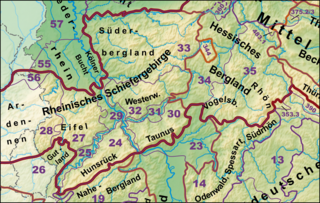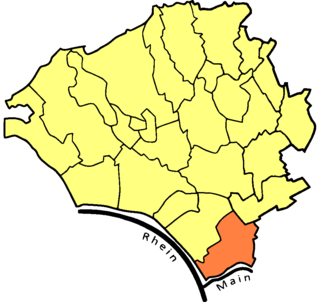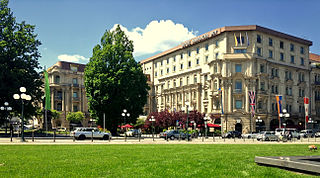
The Horst-Schmidt-Kliniken in the district of Dotzheim is the largest hospital complex in Wiesbaden founding in 1879, owing to its affiliated institutions and 1,027 beds. In 1982 the new buildings were relocated to the present location. [1]

The Horst-Schmidt-Kliniken in the district of Dotzheim is the largest hospital complex in Wiesbaden founding in 1879, owing to its affiliated institutions and 1,027 beds. In 1982 the new buildings were relocated to the present location. [1]
Main-Taunus is a Kreis (district) in the middle of Hessen, Germany and is part of the Frankfurt/Rhine-Main Metropolitan Region as well as the Frankfurt urban area. Neighboring districts are Hochtaunuskreis, district-free Frankfurt, Groß-Gerau, district-free Wiesbaden, Rheingau-Taunus. It is the second most densely populated rural district in Germany.
Dark wave is a music genre that emerged from the new wave and post-punk movement of the late 1970s. Dark wave compositions are largely based on minor key tonality and introspective lyrics and have been perceived as being dark, romantic and bleak, with an undertone of sorrow. The genre embraces a range of styles including cold wave, ethereal wave, gothic rock, neoclassical dark wave and neofolk.

The Frankfurt Auschwitz trials, known in German as Der Auschwitz-Prozess, or Der zweite Auschwitz-Prozess, was a series of trials running from 20 December 1963 to 19 August 1965, charging 22 defendants under German criminal law for their roles in the Holocaust as mid- to lower-level officials in the Auschwitz-Birkenau death and concentration camp complex. Hans Hofmeyer led as Chief Judge the "criminal case against Mulka and others".

Nordenstadt is one of Wiesbaden's eastern suburbs, and was incorporated into the city of Wiesbaden on 1 January 1977. Its population is 7,829 (2020). It hosted the first corporate headquarters of Daewoo Germany in the early 1990s.

Hessischer Rundfunk, shortened to HR, is the German state of Hesse's public broadcasting corporation. Headquartered in Frankfurt, it is a member of the national consortium of German public broadcasting corporations, ARD.
The Rokudōji Station is a city tram station located in Imizu, Toyama Prefecture, Japan. The Takaoka Kidō Line and Shin-Minato Harbor Line meet at this station. The station's name was changed from Shin-Minato Station in March 1985.

Louis Kugelmann, or Ludwig Kugelmann, was a German gynecologist, social democratic thinker and activist, and confidant of Marx and Engels.

Athletes from East Germany competed at the 1968 Summer Olympics in Mexico City, Mexico. 226 competitors, 186 men and 40 women, took part in 124 events in 18 sports. It was the first time that West Germany and East Germany had sent separate teams to the Summer Olympic Games.

SMS Wiesbaden was a light cruiser of the Wiesbaden class built for the Imperial German Navy. She had one sister ship, SMS Frankfurt; the ships were very similar to the previous Karlsruhe-class cruisers. The ship was laid down in 1913, launched in January 1915, and completed by August 1915. Armed with eight 15 cm SK L/45 guns, Wiesbaden had a top speed of 27.5 knots and displaced 6,601 t at full load.
The Europaviertel in Wiesbaden is a former barracks area named Gersdorff Kaserne at the edge of the city center of the Hessian state capital, approximately 2 kilometers southwest of the Marktkirche.

The Rhenish Massif, Rhine Massif or Rhenish Uplands is a geologic massif in western Germany, eastern Belgium, Luxembourg and northeastern France. It is drained centrally, south to north by the river Rhine and a few of its tributaries.

Mainz-Kostheim is a district administered by the city of Wiesbaden, Germany. Its population is 14,381. Mainz-Kostheim was formerly a district of the city of Mainz, until the public administration by the city of Wiesbaden was decided on 10 August 1945. The reason for this had been the easy control of the Allied Occupation Zones in Germany, where the Rhine formed the border between the American sector and the French sector. Mainz-Kostheim faces the city of Mainz on the opposite shore of the Rhine river.

Mainz-Amöneburg is a district administered by the city of Wiesbaden, Germany. Its population is 1,743 (2020). Mainz-Amöneburg was formerly a district of the city of Mainz, until the public administration by the city of Wiesbaden was decided on August 10, 1945. The reason for this had been the easy control of the Allied Occupation Zones in Germany, where the Rhine formed the border between the American sector and the French sector. Mainz-Amöneburg faces the city of Mainz on the opposite shore of the Rhine river. The former border between the Grand Duchy of Hesse and the Prussian Province of Hesse-Nassau lay between Amöneburg and Biebrich until 1945.
Hessloch is a borough of Wiesbaden, the capital of the state of Hessen, Germany. It is the smallest and least-populated of Wiesbaden's boroughs with 663 residents. The formerly independent village was incorporated into Wiesbaden on 1 April 1928.

The Ländches Railway (Ländchesbahn) is a single-track non-electrified branch railway line between Wiesbaden and Niedernhausen, in the German state of Hesse. The 19.6-kilometre (12.2 mi) long line was opened in 1879. It is now Deutsche Bahn route 627 and route 21 of the Rhein-Main-Verkehrsverbund.

Nassauer Hof is a luxury five-star superior hotel in Wiesbaden, Germany, and member of the international association The Leading Hotels of the World as well as the German association Selektion Deutscher Luxushotels. The property was built in 1813 and is situated across from the Wiesbaden Kurhaus and at the end of Wiesbaden's luxury shopping avenue Wilhelmstrasse.

Rheingauer Kantorei, now Neue Rheingauer Kantorei, is a mixed choir of the Rheingau region in Germany, performing mostly sacred music in services and concerts.

The Kulturzentrum Schlachthof in Wiesbaden, Hesse, Germany, is a cultural center in a complex which formerly housed the municipal slaughterhouse, approximately 500 meters southeast of the Wiesbaden Hauptbahnhof railway station. The cultural center, known as Schlachthof, was founded in 1994. It offers two concert halls for events from 300 to 2,000 people; the large concert hall has an area of about 1,200 square meters. The location is used for concert in rock, metal and punk, for music parties, poetry slams and readings. It is surrounded by a leisure park.
Florian-Horst Carstens is a German professional footballer who plays as a centre-back for Wehen Wiesbaden.
Al-Masajid is an archaeological site from the Old South Arabian-Sabaean period, which lies at the edge of the Yemeni highland-basin, below the Jabal Ṣaḥl mountain range near the border with Qataban.